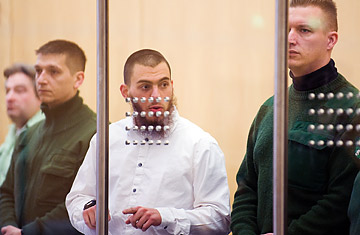
Daniel Schneider attends the 'Sauerland group' terror trial at the Duesseldorf county court in Duesseldorf, Germany.
They were young disaffected men who were radicalized and turned into Islamist militants bent on killing American soldiers stationed in Germany. In a Düsseldorf courtroom where the four men were standing trial this week, Judge Ottmar Breidling said the defendants had dreamed of "mounting a second 9/11." But their plot went awry when German police were tipped off to their activities and special forces raided their hideout in September 2007. On Thursday, as Germany's biggest Islamic terrorist trial came to an end, the four men — dubbed the "Sauerland cell" — were convicted of a number of terror-related charges, including conspiracy to murder, and received prison sentences ranging from five to 12 years apiece.
The verdicts brought to a close a 10-month trial that highlighted the danger of homegrown terrorists in Germany. The defendants — Fritz Gelowicz, 30, and Daniel Schneider, 24, both Germans; Adem Yilmaz, a 31-year-old Turk; and Atilla Selek, a 25-year-old Turkish-German — had confessed to all of the charges against them. Prosecutors detailed how they had plotted to bomb U.S. military bases in Germany, such as Ramstein Air Base, as well as places like discos and pubs where U.S. service personnel were known to go. The attacks were planned for October 2007, just before a parliamentary vote was scheduled on extending Germany's troop deployment in Afghanistan. Had the men succeeded, Breidling said there would have been "a monstrous bloodbath, primarily among U.S. army personnel and also civilians."
But the bombings never went off as planned. The cell members had been under surveillance for months after German police received a tip-off from U.S. intelligence services. Then, just before they were to strike, police raided the men's hideout in the central region of Sauerland and found dozens of detonators and 700 liters of concentrated hydrogen peroxide, a chemical used in hair bleach, which, when mixed with other chemicals, can be used to make explosives. Investigators said the men had enough explosive materials to build bombs equivalent to 880 pounds of dynamite — more powerful than the bombs used in the Madrid and London terror attacks.
The leader of the group was Gelowicz, who was born in Munich and converted to Islam when he was 16. Though he became a devout Muslim, he appeared to lead the life of a normal teenager — he even played quarterback on an American football team. Things changed, however, when he started visiting an Islamic center in the southern city of Neu-Ulm and found himself outraged over the photos of the Abu Ghraib prison scandal in Iraq and the terror suspects being held at Guantanamo Bay. "This Islamic center was a meeting place for young Muslims and they felt a sense of belonging and security there," says Thomas Wandinger, a security expert at Munich's Institute of Politics and International Studies.
Gelowicz's lawyers say the catalyst for his transformation to extremism was apparently Khaled el-Masri, a German of Lebanese descent, who prayed at the Islamic center with him. El-Masri claims he had been abducted by the CIA in Macedonia in 2003 and taken to Afghanistan, where he was held for five months on suspicion of having links to al-Qaeda. (His detention was later revealed to be a case of mistaken identity and the case became the subject of a Bundestag inquiry.) "Gelowicz told the court that 'The Americans have brought the war to my mosque,'" defense attorney Dirk Uden tells TIME. "Gelowicz was obsessed by the idea to fight against the war on terror — he wanted jihad either in Iraq or Chechnya, wherever he could."
During the trial, Gelowicz admitted he had been a member of the al-Qaeda-linked, Pakistan-based terrorist group, Islamic Jihad Union, and that in 2006, he had traveled to an IJU training camp in northwestern Pakistan on the border with Afghanistan where he received training in weapons and explosives and met Schneider, who later became one of the other operatives in the Sauerland cell. On their return to Germany, Gelowicz's lawyer says the men discussed a number of high-profile U.S. targets, like Ramstein Air Base. "They had clear goals — they wanted to kill U.S. soldiers in Germany and they wanted German troops to pull out of Afghanistan," Uden says.
Counterterrorism experts say the trial confirmed for the first time the existence of an IJU cell on German soil. "The IJU showed it was determined to plot terrorist attacks in Europe," says Guido Steinberg, an analyst at the German Institute for International and Security Affairs in Berlin. And, according to Steinberg, the number of homegrown extremists has only increased since then. He estimates that in 2009, around 40 jihadists traveled from Germany to terrorist training camps in Pakistan. "The challenge for the German authorities is to reach out to these young men and small Islamist groups as early as possible," Wandinger says. "We need to get into the heads of potential terrorists and analyse their motives."
The confessions of the men in the Sauerland cell were so thorough and detailed that even prosecutors were surprised. But did they regret their actions? Gelowicz's lawyer points out that his client said during the trial "luckily nothing happened," seeming to be relieved their terror plot had been thwarted. Luckily, Germany did avert a major terrorist attack — this time. The question is whether the authorities have learned any lessons to prevent the next homegrown plot from coming to fruition.
